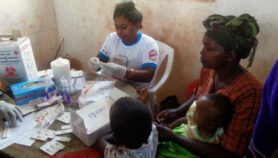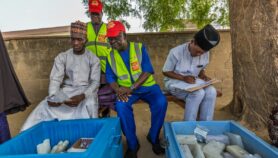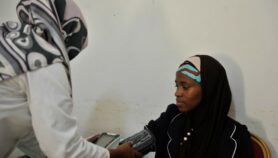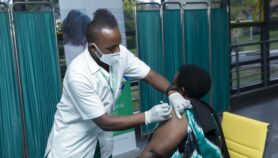26/04/19
Child immunisation as key pathway to health for all
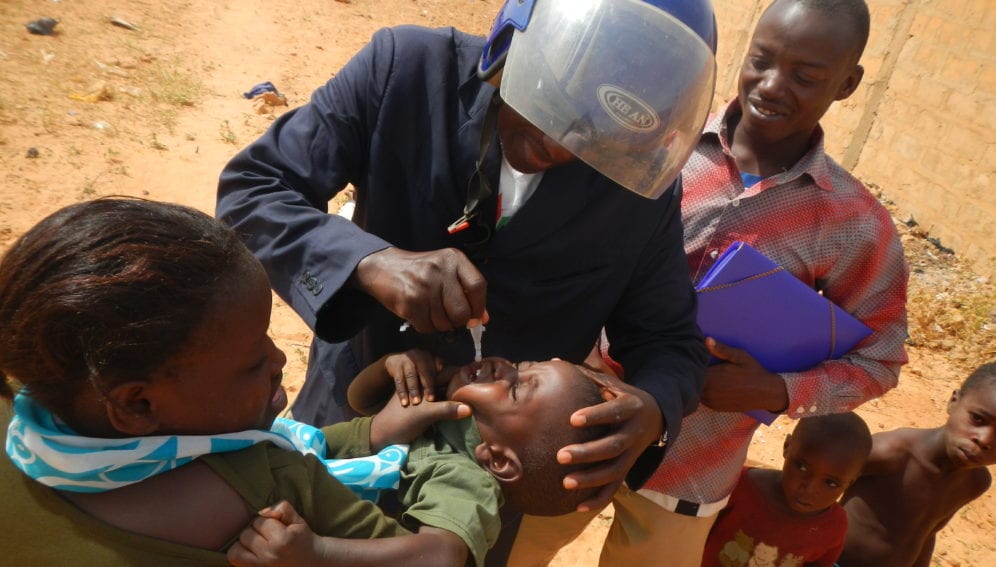
By: Githinji Gitahi and Seth Berkley
Send to a friend
The details you provide on this page will not be used to send unsolicited email, and will not be sold to a 3rd party. See privacy policy.
The Ebola outbreak has been continuing for about six months in the Democratic Republic of Congo. Every life lost is a tragedy but the vaccination programme has given a vital boost to the Ebola response, preventing thousands from contracting this dreadful disease. As of 24 April 2019, more than 104,000 people had been vaccinated against Ebola in the Democratic Republic of Congo.
This is just the latest example of how vaccines have transformed public health in Africa. In recent decades many countries have made tremendous gains in increasing access to immunisation.
Three years ago, African leaders endorsed the Addis Declaration on Immunisation to ensure that every child in Africa receives the full benefits of immunisation. This historic pledge includes commitments to increase political, financial and technical investments in immunisation programmes, as well as making universal access to vaccines a cornerstone of health and development efforts in Africa.
“All children – no matter where they are born – should have access to prevention as well as healthcare including live-saving vaccines.”
Seth Berkley and Githinji Gitahi
In parallel, political support for universal health coverage — the idea that everyone should be able to access quality health services without suffering financial hardship — is gaining momentum across Africa. Most countries recognise the importance of promoting ‘health for all’, both as a means of improving health outcomes, and because it is the right thing to do.
However, achieving universal health coverage for many countries may look like a grand challenge. Thus, a step-wise approach that involves adding the most cost-effective interventions first, and as there are more resources, further expanding interventions might be more attainable.
Immunisation and universal health coverage
One particular entry point to universal health coverage is immunisation, which is one of the most cost-effective interventions and is commonly used to measure the strength of a country’s healthcare system.
In the past, countries have used the foundation laid for delivering immunisation services to strengthen access to other healthcare services. For instance, when Ebola cases were confirmed in Abuja, Nigeria in July 2014, community networks built at the time of polio immunisation programmes were repurposed to actively find cases and track potential chains of Ebola transmission, helping the country stop Ebola in three months.
However, vaccine-preventable diseases are still killing more than half a million children under five in Africa every year. [4] Coverage rates have stagnated at around 74 per cent in recent years — well below the global target of 90 per cent.
Children need access to healthcare
All children —no matter where they are born — should have access to prevention as well as healthcare including live-saving vaccines. This is a fundamental principal of universal health coverage. Yet low-income, migrant and marginalised groups continue to face disproportionate challenges accessing prevention and quality, affordable healthcare.
“We need to develop effective pathways for immunisation delivery in these settings, which will be different from the “business as usual” of immunisation delivery elsewhere.”
Seth Berkley and Githinji Gitahi
Achieving health for all in Africa means paying close attention to the needs of these key populations. Vaccines are one of the few interventions that act as a unifier across those with varying social and economic realities. Vaccines play a role in financial risk protection by preventing illness (and subsequent high-cost treatments) and protect children from diseases in places where medical attention could be several days away. In this sense, vaccines truly embody the principle of universal health coverage because immunised children are protected from disease no matter where they live.
Effective immunisation delivery systems needed
Looking at the immunisation coverage data more closely, one realises that many countries in Africa such as the Democratic Republic of Congo, Somalia and South Sudan with low immunisation rates have fragile health systems. These countries are vulnerable to crisis, such as armed conflict, a sudden economic shock, environmental shock or a major disease outbreak such as the Ebola outbreak.
In fact, almost two-thirds of unvaccinated children live in fragile countries or those affected by conflict, and more needs to be done to tailor immunisation delivery systems to these contexts.
To reach unvaccinated children, we need to develop effective pathways for immunisation delivery in these settings, which will be different from the “business as usual” of immunisation delivery elsewhere. In 2017, almost 9.8 million children in Africa were under-immunised, and did not receive all three doses of a diphtheria-tetanus-pertussis (DTP)-containing vaccine.
The same year, eight African countries including Central African Republic, Chad and Nigeria, had an immunisation rate of less than 50 per cent, with many of these countries being fragile states and states affected by emergencies. Past experience shows that in countries where immunisation rates have dramatically dropped due to fragility and conflict, political leadership has been vital in turning the situation around.
As commitment to reaching the last mile in health gains momentum, it is critical that we come together as a community — political leaders, technical experts and civil society alike — to find ways to deliver basic healthcare services such as immunisation to every person no matter where they come from.
In March, key experts and institutions from diverse sectors and countries gathered at the Africa Health Agenda International Conference 2019 in Rwanda to take forward these conversations on political will, cooperation and strengthening health systems with the goal of realising universal health coverage across the continent by 2030.With the Addis Declaration on Immunisation and commitments to achieving healthcare for all, heads of states across Africa have shown bold leadership in prioritising progress on healthcare. This leadership is key.
But to be successful, these commitments at the political level need to be coupled with effective partnerships and an engaged civil society, reflecting the local circumstances and national dialogues that must shape each country’s unique pathway towards health for all.
Seth Berkley is CEO of Gavi, the Vaccine Alliance and can be reached via [email protected] Githinji Gitahi is Group CEO of Amref Health Africa and -chair of the UHC2030 Steering Committee, and can be reached via [email protected]
This piece was produced by SciDev.Net’s Sub-Saharan Africa English desk.
References
[1] Situation épidémiologique dans les provinces du NORD-Kivu et de l'ituri (Ministry of Health, Democratic Republic of Congo, 24 April, 2019)
[2] The Addis Declaration on Immunisation (WHO, 2016)
[3] Successful Ebola responses in Nigeria, Senegal and Mali (WHO, 2015)
[4] Business case for WHO immunisation activities on the African continent 2018-2030 (WHO Regional Office for Africa, 2018)
[5] Global Routine Vaccination Coverage, 2016 (US National Library of Medicine National Institutes of Health)
[6] Global Vaccine Action Plan 2011-2020 (WHO)
[7] Two-thirds of unimmunized children live in conflict-affected countries – UNICEF (2019)
[8] Global Vaccine Action Plan: Regional reports on progress towards GVAP-RVAP goals. Annex to the GVAP Secretariat annual report (WHO, 2018)
[9] Immunisation (UNICEF, July 2018)



